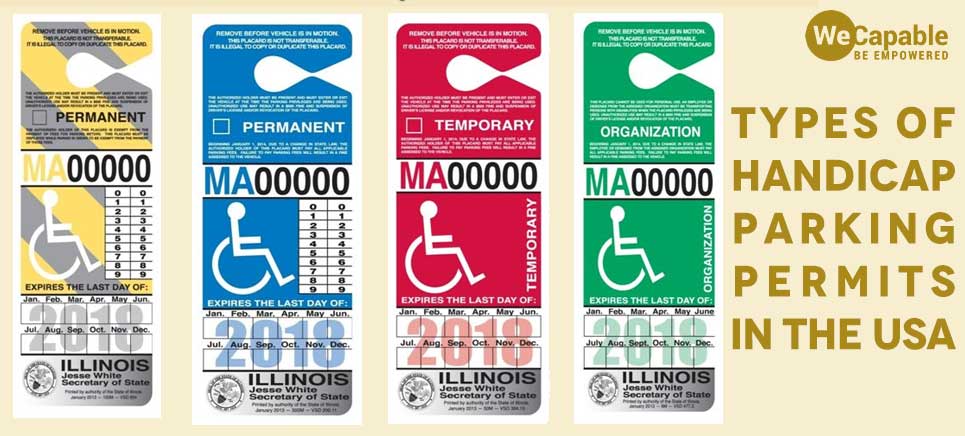In the United States, a handicap or accessible parking permit is mandatory for using accessible parking spaces at public places. One cannot use those designated parking spaces without the permit even if their disability is clearly visible. In this article, we will discuss the eligibility for handicap parking, the meanings of the various kinds of handicap parking permits and proper use of such permits.
Eligibility for a Handicap Parking Permit
The first thing we need to consider is the eligibility for a handicapped parking permit. A layman might think that any person with a disability will be eligible for a handicapped parking permit. But, neither the law nor the definition of ‘handicap person’ is so black and white for this purpose.
A handicap parking permit provides access to a parking spot near the entrance and it is meant specifically for those with limited or painful mobility. This does not necessarily need to be a visible disability like those of a wheelchair user. The specific criteria may vary from state to state but there are some common conditions that make a person eligible for a handicapped parking permit. The conditions include –
- Chronic arthritis
- Lung diseases
- Heart diseases
- Substantially impaired mobility (wheelchair users, crutch users etc.)
- Any diseases that limit the ability to walk or makes walking painful
- Amputation of both upper limbs or one or both lower limbs
- A disease that requires portable oxygen
- Documented vision impairment
- Temporary conditions – major surgery, pregnancy with complications
Applying for a Handicap Parking Permit in USA
The local Department of Motor Vehicle (DMV) is the competent authority for granting handicap parking permits. Hence, the exact rules and criteria may differ for different states and localities. The general rules, however, are similar. The steps for applying for and getting a handicapped parking permit are –
- Getting handicapped parking permit application from the local Department of Motor Vehicle (DMV) – this can be done online or offline
- Fill the form and get it completed and certified by your health care provider. Verification of the medical condition is important to be done by state-certified healthcare professionals.
- Submit the filled form. If you are eligible and your medical condition is certified by a healthcare professional DMV will grant you the parking permit for which you are eligible.
Types of Handicap Parking Permit
There are different types of accessible parking permits and they are commonly differentiated based on the color of the permit. Here are some of the most common color-coded handicap parking permits.
1. Red Handicap Parking Permit – The red colored accessible parking permits are temporary in nature. These are granted for temporary conditions like complicated pregnancy, broken limbs etc. This type of parking permit is commonly granted for a period of six months. If the person further needs the permit she needs to get it reissued.
2. Light-Blue Handicap Parking Permit – The light blue colored disability parking permit is granted for wheelchair-user-only designated parking spaces. These are permanent in nature but different states have different renewal practices.
3. Dark-Blue Handicap Parking Permit – These are the most commonly seen handicap parking permit. These are issued for disability of permanent nature. Despite indicating permanent disability they need to be renewed based on the state laws.
4. Green Handicap Parking Permit – The green colored permit is not so common handicap parking permit. These are not granted to an individual but to organizations that transport disabled individuals. These too are subject to renewal based on the state laws.

Proper Use of Handicap Parking Permit
The most important thing about a handicapped parking permit is that it is to be used only by the person for which it has been issued. Using someone else’s parking permit or letting someone use your handicapped parking permit is wrong ethically as well as legally. Misusing a handicapped parking permit may lead to its cancellation and the lender and the borrower both can be fined for the same.
The law states that a handicap parking permit should be displayed and used only when the person is in the vehicle either as a driver or a passenger. If the person is not in the vehicle the permit must not be used by friends or family to park their vehicle in an accessible parking area.
The permit, as stated above, is issued for the individual. Hence, it can be used in any vehicle being used by the individual.
Use the citation below to add this article to your bibliography
"Handicap Parking Permit: Application, Types and Proper Use." Wecapable.com. Web. June 2, 2025. <https://wecapable.com/handicap-parking-permit-application-types-proper-use/>
Wecapable.com, "Handicap Parking Permit: Application, Types and Proper Use." Accessed June 2, 2025. https://wecapable.com/handicap-parking-permit-application-types-proper-use/
"Handicap Parking Permit: Application, Types and Proper Use." (n.d.). Wecapable.com. Retrieved June 2, 2025 from https://wecapable.com/handicap-parking-permit-application-types-proper-use/

Leave a Reply